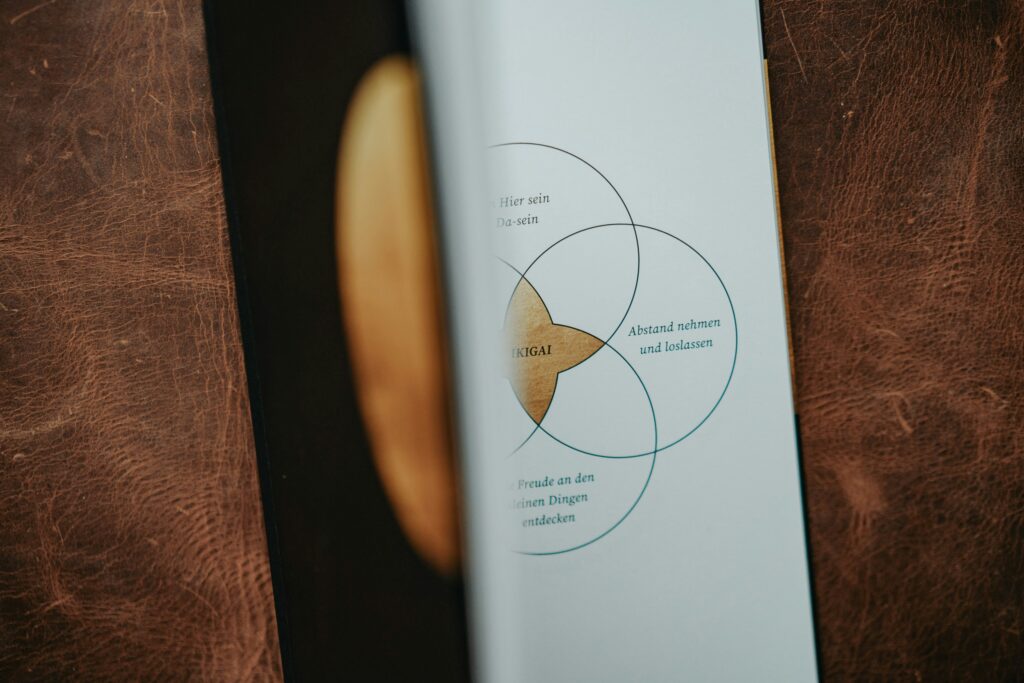Introduction
The Ikigai Book is more than just a guide to finding happiness; it’s a manual for living a life full of purpose and meaning. But what if the lessons from this book could be applied to our travels? Imagine embarking on a journey where every step is infused with deeper significance and joy. In this blog post, we’ll explore how the Ikigai Book can teach us to find purpose on the road, making our adventures not only memorable but truly meaningful.
1. Understanding the Basics: What Is Ikigai?
First, let’s understand what Ikigai is. It is a Japanese concept that combines what you love, what you are good at, what the world needs, and what you can be paid for. The Ikigai Book explores this idea in depth, providing a roadmap to a fulfilling and meaningful life. Imagine applying these principles to your travels!
2. Finding Joy in the Journey

One of the most powerful lessons from the Ikigai Book is finding joy in everyday moments. For example, on the road, this could mean savoring a sunrise, enjoying a local dish, or having a friendly chat with a local. By focusing on these small joys, your travels become richer and more meaningful. Therefore, it’s not just about ticking off sights from a list; it’s about truly experiencing the journey.
3. Traveling with Intention
Before you pack your bags, the Ikigai Book suggests setting clear intentions for your trip. Are you looking to learn something new, connect with different cultures, or find a quiet place to reflect? Whatever your goal, having a purpose in mind makes your travels more fulfilling. Consequently, it’s like having a compass that guides your adventures.
4. Connecting with Local Communities
Moreover, the Ikigai Book emphasizes the importance of social connections. When traveling, this means immersing yourself in local communities. Try staying in a homestay, volunteering, or simply striking up conversations with locals. These interactions can provide deep insights into different ways of life and help you form lasting connections.
5. Embracing Personal Growth
Furthermore, travel is a fantastic way to grow personally. The Ikigai Book encourages continuous learning and self-discovery. Whether it’s picking up a few words of a new language, learning to cook a local dish, or overcoming a travel challenge, every experience contributes to your personal growth. Thus, embrace these opportunities and watch yourself transform.
6. Balancing Adventure and Relaxation
While adventure is exciting, it’s also essential to find moments of relaxation. The Ikigai Book teaches the importance of balance. On your travels, this could mean spending a day exploring a bustling city followed by a day lounging on a peaceful beach. Finding this balance ensures you return home refreshed and enriched.
8. Practical Tips for Purposeful Travel

To make the most of your travels with the principles of the Ikigai Book, try planning trips that align with your passions and skills. Additionally, keep a travel journal to reflect on your experiences and learnings. Stay open to new experiences and be flexible with your plans. Sometimes, the best adventures are the ones you don’t plan for!
Conclusion
The Ikigai Book offers valuable lessons that can turn your travels into meaningful journeys. By finding joy in small moments, traveling with intention, connecting with locals, embracing personal growth, and balancing adventure with relaxation, you can discover a deeper purpose on the road. So, pack your bags with these insights and set off on your next adventure with a new sense of purpose. And remember, the journey is just as important as the destination.
Action
If you’re inspired to find more meaning in your travels, dive into the Ikigai Book for more profound insights. Share your travel stories and how you’ve applied Ikigai principles on the road. Let’s create a community of purposeful travelers who enrich their lives and the world around them. Safe travels!
For more blogs like this, visit Escape Junction.
“If you enjoyed this post, you might also find our article on 10 Exciting Indoor Activities for a Rainy Day interesting.”
